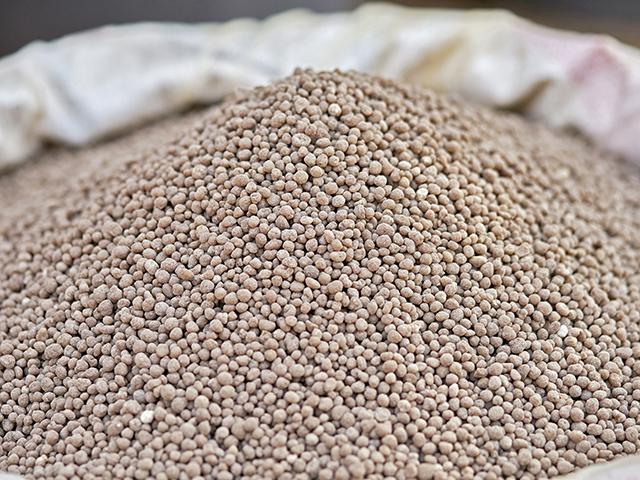Moroccan Phosphate Duties Lowered
NCGA: Big Win as Commerce Department Lowers Import Duties on Phosphate From Morocco
OMAHA (DTN) -- In a win for farmers, the U.S. Department of Commerce finally agreed Thursday to lower punitive import duties on phosphate fertilizer from Morocco from 19.97% down to 2.12%.
The decision, which was praised by the National Corn Growers Association, comes after Commerce officials conducted an administrative review on the countervailing duties by "retroactively examining the price of shipments and other factors," NCGA stated.
NCGA and other agricultural groups had been pressing the International Trade Commission, which is part of the Commerce Department, to reverse the 19.97% tariff on phosphate fertilizer from Morocco that was originally handed down in spring 2021. The issue especially came to the forefront as prices for nearly every major form of fertilizer skyrocketed as the International Trade Commission made its ruling.
"This victory was made possible by corn growers across the country who spoke out against these duties as they faced skyrocketing fertilizer prices and product shortages at the behest of The Mosaic Company," said Harold Wolle, a Minnesota farmer and president of NCGA. "While the best duty on fertilizers is no duty at all, we are nonetheless thrilled that corn growers bearing the brunt of these tariffs will feel financial relief thanks to this decision."
The International Trade Commission (ITC) had ruled to slap the import tariffs on phosphate fertilizer from both Morocco and Russia following a petition brought by U.S.-based Mosaic to impose duties on phosphate fertilizers imported from Morocco and Russia. The ITC agreed with Mosaic that Morocco and Russia were unfairly subsidizing their phosphate exports and flooding the U.S. market.
Along with lowering the countervailing duties on Moroccan phosphate, the Commerce Department raised the duties on Russian producer PhosAgro from 9.19% to 28.5% as well.
Mosaic issued a statement that the company is disappointed by the ruling on the Moroccan imports and is considering its next steps.
P[L1] D[0x0] M[300x250] OOP[F] ADUNIT[] T[]
"We at Mosaic expect and welcome fair competition all around the world, and we are confident that Mosaic can compete on a level playing field. We will continue to seek remedies when we see unfair practices," said Joc O'Rourke, Mosaic's CEO. He added,
"Our Moroccan competitor continues to enjoy the subsidies that led to the duties, and those subsidies provide a substantial unfair advantage," O'Rourke said. "That said, we expect today's ruling could impact trade flows, but it should have little impact on global phosphate fertilizer supply and demand dynamics."
O'Rourke added, "The countervailing duties have been effective as many new entrants shipped phosphate to the U.S. and helped create a fair and competitive market here, and prices in the U.S. returned to parity with global benchmarks."
NCGA and 62 other agricultural groups -- including state corn grower organizations -- sent a letter to Commerce Secretary Gina Raimondo last month calling on her to consider the current difficulties faced by farmers as she recalculates duties on phosphate fertilizer imported from Morocco. That letter and previous actions by corn growers culminated in Thursday's decision, NCGA stated.
Daryl Cates, an Illinois farmer and president of the American Soybean Association, also welcomed the news on Moroccan imports. "The Commerce Department's determination comes after years of engagement by the American Soybean Association in which the soy industry has voiced opposition to duties imposed on phosphate fertilizer imports. Soybean farmers across the country have made their voice heard: These tariffs on fertilizer have had a direct impact on the bottom line of farmers. We appreciate Commerce's recognition of this impact and its subsequent lowering of duties, and we will continue to advocate against harmful tariffs."
A bipartisan group of lawmakers from both the Senate and the House also had written Raimondo on Oct. 24 calling on her to reduce the tariffs on Morocco's phosphate. The lawmakers noted that U.S. farmers use roughly 7.4 million metric tons of phosphate fertilizer annually. Imports are required to supply roughly 2.7 million metric tons of that amount.
A judge for the U.S. Court of International Trade also ruled in September on an appeal by Moroccan-based OCP North America and other fertilizer companies that opposed the tariffs on Morocco's phosphate. The judge ruled that the ITC didn't adequately consider that "domestic producers closed facilities resulting in decreased fertilizer production." For instance, Mosaic had closed a 2 million-metric-ton fertilizer facility in Florida at the end of 2017. Another decision on that appeal of the ITC ruling is expected on Dec. 13.
In a statement, OCP Group said it welcomes the Commerce announcement, which is retroactive to 2021. OCP stated the company continues to believe there is no justification for any tariffs on its U.S. fertilizer imports.
"We therefore look forward to the DOC's and the US International Trade Commission's redeterminations in the next few months in response to the remand orders issued in September 2023 by the US Court of International Trade. We remain, as always, ready to provide the US agencies with any further information they may require to complete their redeterminations. We are grateful to all those voices representing US farmers who spoke out loudly in opposition to these duties," OCP stated.
Phosphate is used to make both MAP and DAP. According to retail fertilizer price data tracked by DTN, MAP is 19% lower than it was a year ago, and DAP is 23% lower than last year's prices.
Also see "DTN Retail Fertilizer Trends" here:
Chris Clayton can be reached at Chris.Clayton@dtn.com
Follow him on X, formerly known as Twitter, @ChrisClaytonDTN
(c) Copyright 2023 DTN, LLC. All rights reserved.






